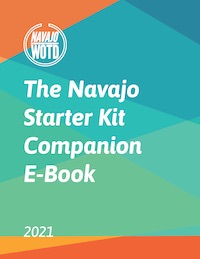shih-lth lth-ih kahn
The Navajo words shił łikan together mean roughly “…it tastes good to me” or “I like it” in reference to something that you eat or drink.
The first word, shił, translates to “with me” and is used to point the word it precedes towards an individual or group. Other words like this include nił (“with you”), bił (“with him/her/it”), and nihił (“with us” or “with you two/three/etc.”).
Otherwise, the word łikan alone would simply mean sweet, tasty, or palatable without any indication of who experiences the sensation.
You could say, “Bilasáana bitoo’ éí shił łikan.” (In Navajo, éí is a filler word, like the English um or uh, and not at all frowned upon).
Or, you can negate it and say something like, “Atoo’ éí doo shił łikan da,” which means “I do not like mutton stew.” Of course, it is impossible to dislike mutton stew so you’ll never hear nor say that phrase. It was just an example.
